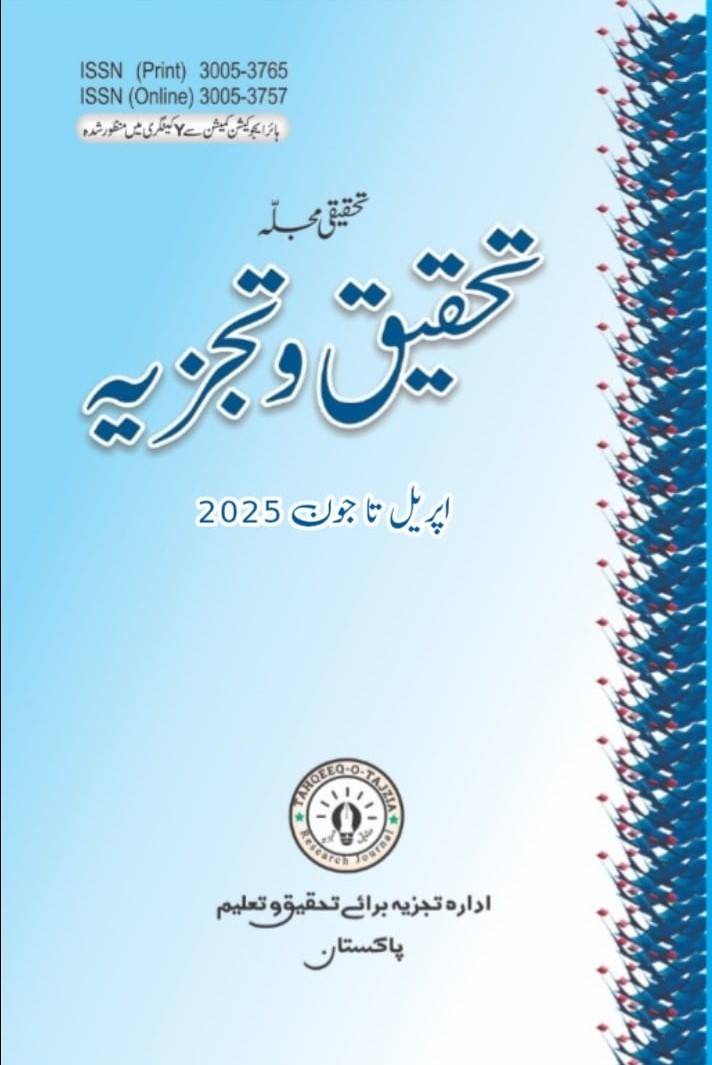Mystical Ideas of Allama Iqbal
Keywords:
Allama،Iqbal, philslophyical, Mystical, Divine selfhood, poetry, Pakistani LiteratureAbstract
This study explores Allama Muhammad Iqbal’s conception of Tasawwuf (Islamic mysticism) and his dynamic reinterpretation of Sufi philosophy within the framework of modern Islamic thought. While classical Sufism emphasizes fana fi-Allah (annihilation in God), asceticism, and withdrawal from worldly affairs, Iqbal transforms it into an active philosophy of life rooted in khudi (selfhood) and ishq (divine love). For Iqbal, Sufism is not merely a quest for inner tranquility but a movement toward self-realization and social transformation through divine consciousness. He criticizes static forms of mysticism that promote passivity, yet he embraces those Sufi elements—love, spiritual insight, and divine unity—that awaken the individual’s creative and moral potential.The paper examines Iqbal’s engagement with major Sufi thinkers such as Rumi, Ibn ‘Arabi, and Al-Ghazali, and his attempt to reconcile spiritual intuition (kashf) with rational intellect. Iqbal’s early poetry, particularly in Bang-e-Dara, bears traces of wahdat al-wujud (Unity of Being), reflecting the influence of Rumi’s mystical universalism. However, with the formulation of khudi, he moves toward wahdat al-shuhud (Unity of Witness), where the self becomes an active participant in divine creativity rather than dissolving in it.Iqbal’s metaphysical system presents God as the Absolute Ego—a living, dynamic, and self-conscious reality whose creative activity is ceaseless. Human selfhood (ego) is a reflection of this divine self, endowed with freedom, moral responsibility, and creative will. Iqbal thus rejects deterministic fatalism (jabr) and advocates for an empowered human agency. Through self-affirmation and moral struggle, man participates in the divine process of creation, transforming both self and society. In this sense, his interpretation of Sufism integrates tazkiyah (purification of the soul) with amal (constructive action), bridging the gap between spirituality and social ethics.The study concludes that Iqbal’s philosophy of mysticism harmonizes Qur’anic monotheism with Sufi spiritual experience. He envisions a Sufism of action, where the true mystic is a reformer, not a recluse; a participant in divine creativity, not a passive observer. His doctrine of khudi becomes the cornerstone of this spiritual activism, guiding humanity toward self-realization, divine love, and the reconstruction of the moral world. Thus, Iqbal’s Tasawwuf represents both a revival of classical mysticism and its transformation into a philosophy of empowerment, freedom, and eternal progress.
References:
- Muhammad Iqbal, Allama, Bang-e-Dra, Lahore: Maktaba Daniyal, 2013, p. 61.
- Muhammad Iqbal, Allama, Kulliyat-e-Iqbal, Lahore: Sheikh Ghulam Ali and Sons, 1982, p. 124.
- Muhammad Iqbal, Allama, Payam-e-Mashriq, Lahore: Maktaba Daniyal, 2013, p. 182.
- Shafiqur Rahman Hashmi, Iqbal ka Tasavvur-e-Deen, Lahore: Ferozsons Ltd., p. 119.
- Ishrat Haq Nawaz, Iqbal ki Maba’ad al-Tabi‘yat, Tr. Shamsuddin, p. 9.
- Muhammad Iqbal, Allama, Bal-e-Jibril, Lahore: Maktaba Daniyal, 2013, p. 93.
- , p. 212.
- Muhammad Iqbal, Allama Dr., Bang-e-Dra, p. 102.
- , p. 142.
- Muhammad Iqbal, Allama Dr., Zarb-e-Kalim, Lahore: Maktaba Daniyal, 2013, p. 92.
- Muhammad Iqbal, Allama Dr., Armaghan-e-Hijaz, Lahore: Maktaba Daniyal, 2013, p. 169.
- Muhammad Iqbal, Allama Dr., Bal-e-Jibril, Lahore: Maktaba Daniyal, 2013, p. 43.
- Muhammad Iqbal, Allama Dr., Zarb-e-Kalim, p. 50.
- , p. 84.
- Muhammad Iqbal, Allama Dr., Armaghan-e-Hijaz (Farsi), Lahore: Maktaba Daniyal, 2013, p. 1113.
- Muhammad Iqbal, Allama Dr., Bal-e-Jibril, p. 38.
- Muhammad Iqbal, Allama Dr., Zarb-e-Kalim, p. 124.
- Muhammad Iqbal, Allama Dr., Armaghan-e-Hijaz, p. 154.
- Muhammad Iqbal, Allama Dr., Armaghan-e-Hijaz (Urdu), Lahore: Maktaba Daniyal, 2013, p. 158.
- Muhammad Iqbal, Allama Dr., Javid Nama, Lahore: Maktaba Daniyal, 2013, p. 828.
- Muhammad Iqbal, Allama Dr., Zabur-e-Ajam, Lahore: Maktaba Daniyal, 2013, p. 595.
- Abdur Rahman Tariq, B.A., Jahan-e-Iqbal, Lahore: Malik Din Muhammad and Sons, p. 22.
- Muhammad Iqbal, Allama Dr., Bal-e-Jibril, p. 96.
- Sharah Kulliyat-e-Iqbal (Urdu), Lahore: Sheikh Ghulam Ali and Sons, 1982, p. 39.
- Muhammad Iqbal, Allama Dr., Zabur-e-Ajam, p. 541.
- Muhammad Iqbal, Allama Dr., Asrar-e-Khudi, Lahore: Maktaba Daniyal, 2013, p. 121.
- Muhammad Iqbal, Allama Dr., Zarb-e-Kalim, p. 20.
- Muhammad Iqbal, Allama Dr., Armaghan-e-Hijaz (Urdu), p. 188.
- , p. 1052.
Downloads





